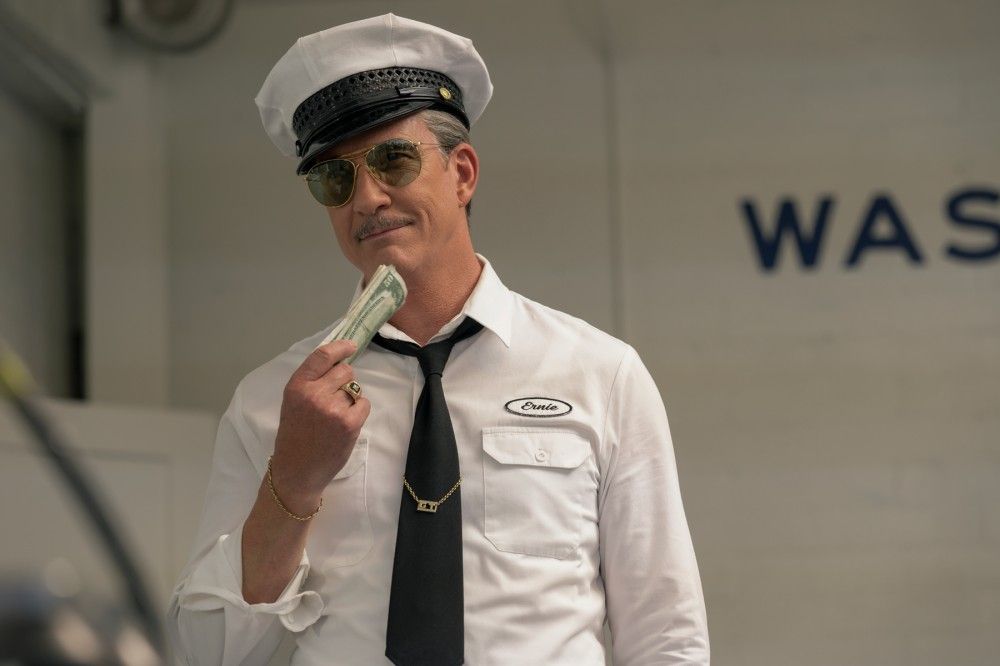
The True Story Behind the Gas Station Sex Ring in Ryan Murphy's 'Hollywood'
, ’s jaunty fantasy of 1940s Tinseltown, is a reimagining of film history featuring both real-world and fictional silver-screen luminaries. And according to many of the critics who’ve reviewed it thus far, it leans more heavily toward fiction, arguably whitewashing history in a problematic fashion.
The gas station sex ring run by the debonair pimp Ernie (Dylan McDermott), however, is not a product of the Hollywood imagination. It’s fully based in fact — or at least, one longtime Hollywood man-about-town’s version of it. Ernie is partly based on Scotty Bowers, the author of the memoir Full Service and subject of the 2018 documentary Scotty and the Secret History of Hollywood. Bowers, who died in 2019 at the age of 96, claimed in his book to have secretly run an escort ring for the glitterati, procuring sex partners for everyone from Rock Hudson (who is portrayed by Jake Picking in Hollywood) to Katharine Hepburn to Cary Grant.
Who Was Scotty Bowers?
A former World War II GI from a small town in Illinois, Bowers enlisted in the Marines and fought in the Pacific Theater at Iwo Jima before moving to Los Angeles. According to his book, he first entered the sex industry while working at the Richfield station at 5777 Hollywood Blvd. (now, apparently, a fire station), where Forbidden Planet star Walter Pidgeon picked him up and paid him $20 for sex. From there, Bowers claimed, he transitioned from selling sex to arranging liaisons for such stars as Katherine Hepburn, Spencer Tracy, and Vivien Leigh, establishing a queen bed in a trailer at the gas station for such assignations. He also claimed to have slept with Cary Grant and former FBI director J. Edgar Hoover, and had a threesome with Ava Gardner and Lana Turner (at Frank Sinatra’s house, no less).
Full Service is explicit, aggressively and cheerfully so. Of Spencer Tracy, Bowers writes he “took hold of my penis and began nibbling on my foreskin”; of Cole Porter, who makes a brief cameo appearance in Hollywood, Bowers writes: “He could easily suck off twenty guys, one after the other. And he always swallowed.” Unlike McDermott’s character in Hollywood, Bowers didn’t exactly self-identify as a pimp, claiming in Full Service that he never accepted money for arranging these encounters, simply acting as a “procurer” to the stars for free.
In the 1950s, after he left the gas station, he apparently became well-known among certain circles for serving this role; he was also apparently renowned for his discretion, keeping his clients’ phone numbers in his head so he could never be busted with them. And he was successful in this regard, so much so that a 2006 Variety profile on Bowers’ later life as a Hollywood bartender only vaguely alluded to the “scandalous information” he had on old-time Hollywood. It wasn’t until his memoir was published in 2012 that the world learned of his secrets.

Scotty Bowers on August 4th 2018 at the
‘Scotty and the Secret History of Hollywood’ film screening, after party, in New York City.
Gregory Pace/Shutterstock
How legit are the claims in Full Service?
At the time Bowers’ book was published, most of the subjects in his memoir were dead, so very few had the opportunity to refute or confirm any of the claims set forth in his book. But there are enough people on the record who were around back then to support his version of events — most notably, author Gore Vidal, a close friend of Bowers who supplied a cover blurb for his book — to suggest that his allegations contained at least a grain of truth.
Other Hollywood journalists and filmmakers have also stated that they’d approached Bowers in the past for him to tell his story, only for him to turn them down flat. “I don’t need the money,” he told the New York Times when it was published. “I finally said yes because I’m not getting any younger and all of my famous tricks are dead by now. The truth can’t hurt them anymore.”
Parts of Bowers’ account do strain credulity, particularly the sheer number of famous people he claims to have slept with, as well as the fact that he sometimes comes across as inflating his own significance by placing himself at various historical events (one Los Angeles Times reviewer referred to him as “Forrest Hump”).
But the truth is that, assuming at least some of his allegations are true, Bowers would have had good reason to stay quiet as long as he did (aside from facing prospective legal action, of course). As Bowers explains in his book, 1940s and 1950s movie studios were conservative even by the standards of the time, forcing actors and directors to sign “morals” clauses in their contracts which, among other things, required them to adopt the auspices of heterosexuality, even if they were gay or bisexual in their private lives. Hollywood celebrities like Rock Hudson — who lived as a gay man for decades, but never publicly came out before his death of AIDS in the 1980s — would have relied heavily on Bowers’ discretion to live freely, without fear of career repercussions.
Aside from the sheer breadth of pure celebrity gossip present in Full Service (as well as the range of allusions to erect or partially erect penises), part of what’s so striking about the book is how cheerfully non-judgmental Bowers is, even though he lived and worked in incredibly regressive times. He stubbornly resists any reader’s attempts to categorize him or his (he did end up marrying a woman in the 1980s, living with her until his death last year), and he seems to have harbored this live-and-let-live approach till the day he died.
“I never saw the fascination,” Bowers said of his famous friends’ sex lives. “So they liked sex how they liked it. Who cares?”



